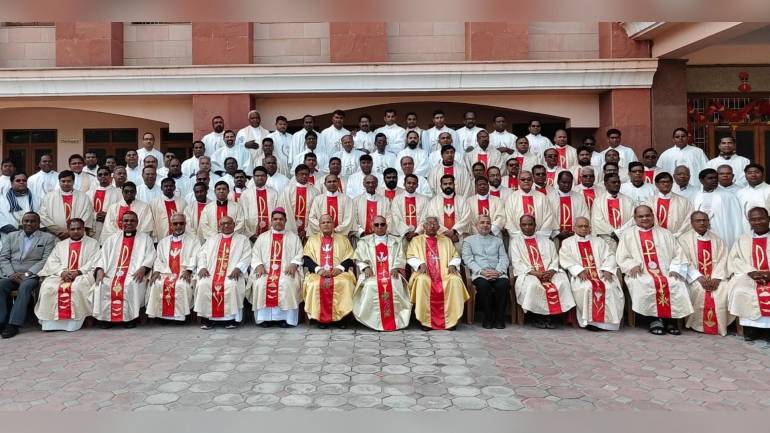India: Diocesan clergy to work for the common good upholding Constitutional values

The XX National Council of the Conference of Diocesan Priests of India (CDPI) convened from January 23 to 25, at the Diocesan Pastoral Center in Jaipur, Rajasthan, and focused on the theme "Upholding the Constitution and Democracy: Responsibilities of Diocesan Clergy in Contemporary India."
As many as 114 diocesan priests representing 51 dioceses participated in the deliberations of the National Council.
Following extensive discussions and reflection, the Council formulated a comprehensive final statement highlighting the imperative role of the diocesan clergy in safeguarding the principles of the Constitution and nurturing democracy in India.
The CDPI is to help the diocesan priests in the country foster a deeper understanding of their priesthood, whereby they appreciate and perform their priestly ministry effectively.
Furthermore, it promotes a spirit of collegiality among priests and deeper collaboration between priests and bishops at the diocesan, regional, and national levels.
CDPI works under the guidance and direction of the Conference of Catholic Bishops of India (CCBI) Commission for Vocation, Seminaries, Clergy, and Religious.
“We discussed, discerned, and resolved an action plan statement for ourselves to make our pastoral engagements more fruitful and effective,” read the final statement of the XX National Council of the CDPI, which was signed by Bishop Varghese Chakkalakal, patron, CDPI, Fr Roy Lazar, President, and Fr Charles Leon, Secretary.
CDPI members said, “As citizens of this nation, we are engaged in various activities that relate to our motherland. We uphold the values enshrined in our Constitution, which contain our duties along with the promise to safeguard our rights, provide a ‘democratic space’ and a ‘voice’ to everyone, and guarantee justice, liberty, equality, and fraternity in this secular and socialistic society."
The people of India can elect leaders who are expected to uphold the aspirations of society and fulfill their dreams.
“We realize that today we live in difficult times where communalism, fundamentalism, casteism, consumerism, clericalism, polarization, and criminalization hold sway,” the statement read.
Several serious realities grip the people of the country today. These include the ongoing violence against the tribals of Manipur and Jharkhand and the atrocities against religious minorities, particularly Christians.
“Our loyalty is first to the Triune God whom we revere, and we unequivocally refrain from any compromise. We have been taught to give to God what belongs to God and Caesar what belongs to Caesar,” the statement said.
In the above context, CDPI members commit to complying with all the requirements mandated by law that do not go against Christian conscience and to ensuring transparency, accountability, and justice in all our transactions and dealings.
They would remain vigilant and address the dangers arising from fascism, fanaticism, and fundamentalism, in search of the last, least, and lost ones.
They would take a stand against the criminalization of politics and the corporatization of the natural resources of indigenous and marginalized people that rightly belong to them.
CDPI would internalize and actualize servant-leadership through prophetic priesthood in the service of the excluded, exploited, and deprived of society.
They would collaborate with all women and men of goodwill, civil society movements, and organizations to promote a more just, equitable, dignified, fraternal, and humane society.
They would also strive to equip people with knowledge of their rights and duties enshrined in the Constitution, motivate eligible voters to enroll them, and exercise their franchise conscientiously.
CDPI members “uphold their pastoral response to welcome, protect, promote, and integrate the migrants in our parish and diocesan communities.”
“Trusting in the Almighty God, who provides wisdom and strength, and in our Mother Mary, who intercedes on our behalf, we commit ourselves to earnestly fulfilling our resolution,” said the statement.
Radio Veritas Asia (RVA), a media platform of the Catholic Church, aims to share Christ. RVA started in 1969 as a continental Catholic radio station to serve Asian countries in their respective local language, thus earning the tag “the Voice of Asian Christianity.” Responding to the emerging context, RVA embraced media platforms to connect with the global Asian audience via its 21 language websites and various social media platforms.













